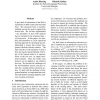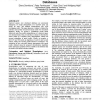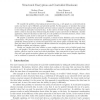131
click to vote
TCSV
2010
14 years 8 months ago
2010
Abstract--We present a novel tracking method for effectively tracking objects in structured environments. The tracking method finds applications in security surveillance, traffic m...
134
click to vote
JMLR
2010
14 years 8 months ago
2010
We present an extension of sparse PCA, or sparse dictionary learning, where the sparsity patterns of all dictionary elements are structured and constrained to belong to a prespeci...
108
click to vote
COLING
2010
14 years 9 months ago
2010
A great deal of information on the Web is represented in both textual and structured form. The structured form is machinereadable and can be used to augment the textual data. We c...
153
click to vote
CIKM
2010
Springer
14 years 10 months ago
2010
Springer
Structured Information Retrieval is gaining a lot of interest in recent years, as this kind of information is becoming an invaluable asset for professional communities such as Sof...
123
click to vote
SIGIR
2010
ACM
14 years 12 months ago
2010
ACM
Keyword queries over structured databases are notoriously ambiguous. No single interpretation of a keyword query can satisfy all users, and multiple interpretations may yield over...
123
click to vote
NAACL
2010
14 years 12 months ago
2010
We describe a method of incorporating taskspecific cost functions into standard conditional log-likelihood (CLL) training of linear structured prediction models. Recently introduc...
116
click to vote
NAACL
2010
14 years 12 months ago
2010
Perceptron training is widely applied in the natural language processing community for learning complex structured models. Like all structured prediction learning frameworks, the ...
132
click to vote
ASIACRYPT
2010
Springer
15 years 2 days ago
2010
Springer
We consider the problem of encrypting structured data (e.g., a web graph or a social network) in such a way that it can be efficiently and privately queried. For this purpose, we ...
109
click to vote
SCL
2010
15 years 13 days ago
2010
Structured singular values and pseudospectra play an important role in assessing the properties of a linear system under structured perturbations. This paper discusses computation...
115
click to vote
PVLDB
2010
15 years 13 days ago
2010
Studies show that about 50% of web search is for information exploration purpose, where a user would like to investigate, compare, evaluate, and synthesize multiple relevant resul...



